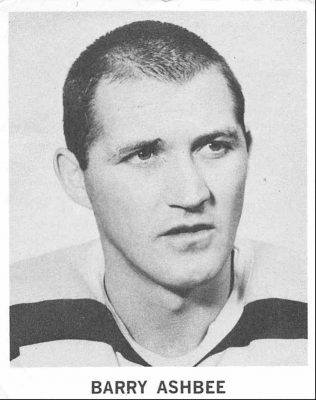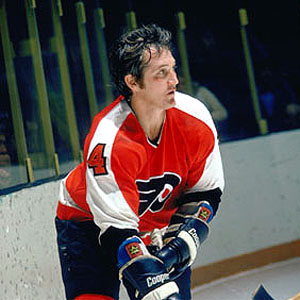
By: Andrew Lindroth | Follow me on Twitter! @andrewlindrothh
William Barry Ashbee was born on July 28th, 1939, in Toronto, Ontario, Canada. Barry began playing in juniors as a 17-year-old defenceman for the Barrie Flyers (OHA-Jr.) in 1956. After his freshman year, Barry was assigned to the junior ‘B’ league and suited up for the Lakeshore Bruins (OHA-B) from 1957-1958. Following his strong comeback and improvement on the ice, the 19-year-old was promoted back to the junior ‘A’ league. In his final year, he played as a top-pairing defenceman for the Barrie Flyers (OHA-Jr.) and produced eight goals, 30 points, and 108 PIM in 53 games.
After graduating from juniors, Barry was picked up by the Boston Bruins in 1959. At the time, the American Hockey League (AHL) and Western Hockey League (WHL) were not entirely under control by the NHL. This left other teams in the league without a minor-pro affiliate, resulting in the creation of the Eastern Professional Hockey League (EPHL), which became the first farm league completely ran and controlled by the NHL. With that being said, after signing with the Bruins, Barry was assigned to the Bruins’ minor-pro affiliate, the Kingston Frontenacs (EPHL). The 5’10, 180-pound defender spent the next three seasons developing with Kingston, recording eight goals, 55 points, and 243 PIM.

Barry eventually began his pro career in the American Hockey League with the Hershey Bears in 1962 and played for the team over the next few years until 1965. During that time, the Boston Bruins traded Barry Ashbee and Ed Chadwick to the Detroit Red Wings in exchange for Bob Perrault, but he later re-joined the Bruins organization after signing as a free-agent. The defenseman recorded six goals and 42 points with a whopping 350 PIM. He impressed the Bruins organization with his relentless work ethic and earned his promotion to the National Hockey League the following season.
Barry played just 14 games with the Bruins before being re-assigned back to the Hershey Bears (AHL) for the remainder of the season and finished with 11 points and 100 PIM in 36 contests. He continued to grind it out for the Hershey Bears over the next five years, putting up 16 goals, 95 points, and 416 PIM. According to Hockey Reference, at some point, Barry was acquired by the Pittsburgh Penguins and, on May 22nd, 1970, was traded to the Philadelphia Flyers in exchange for Larry McKillop and Darryl Edestrand.
During the 1970-1971 season, the 31-year-old defenseman finally earned his spot in an NHL lineup again and maintained a full-time role throughout the year. He concluded his first NHL season as one of the Flyers’ best defencemen and recorded four goals and 27 points.

Despite becoming a full-time NHL player in his 30’s, he continued to play for the Flyers over the next several years and quickly cemented his legacy in Philadelphia. From 1971-1973, Barry appeared in 137 games and posted seven goals, 38 points, and 181 PIM. The 1973-1974 season would end up as the most significant of his career, leading the Flyers to a successful regular season, contributing 17 points in 69 games and earning NHL All-Star team honors. Later, he suffered a severe eye injury during a playoff game against the New York Rangers that forced him to miss the remainder of the post-season. Nevertheless, the Flyers went on to win the Stanley Cup, etching Barry’s name in history forever.
Unfortunately, his eye injury forced him to retire from playing professional hockey, but shortly after was offered the assistant coach position for the Philadelphia Flyers. At first, he denied the offer as he thought the team provided the job out of sympathy but eventually joined a few weeks later for the 1974-1975 campaign. They had another strong performance throughout the season and later became back-to-back Stanley Cup champions. The Flyers eventually retired his #4 in the rafters shortly after their championship victory.
During his five-year tenure in the NHL, Barry suited up for 284 games and recorded 15 goals, 85 points, and 291 PIM. Unfortunately, he later passed away on May 12th, 1977, due to his battle with Leukemia. Now, the Philadelphia Flyers award the ‘Barry Ashbee Trophy’ at the end of each season to the best defenceman.


Leave a Reply